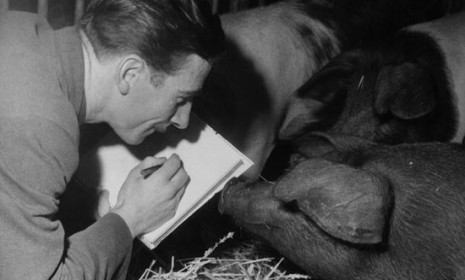7 film adaptations that betray their literary source material
An upcoming family-friendly film version of George Orwell's classic dark satire Animal Farm has many bookworms worried

A free daily email with the biggest news stories of the day – and the best features from TheWeek.com
You are now subscribed
Your newsletter sign-up was successful
As the premier motion-capture actor in the world, Andy Serkis, who memorably played Gollum in The Lord of the Rings trilogy, may seem like an ideal choice to adapt George Orwell's classic 1945 allegory Animal Farm, in which the author uses a series of talking animals to weave a grim story about the nature of power. His recent statements on the project, though, have many literary purists worried. "We're keeping it fable-istic and [aimed at] a family audience. We are not going to handle the politics in a heavy-handed fashion," Serkis told The Hollywood Reporter, in a statement that's sure to dismay fans of Orwell's biting satire. If the new Animal Farm does deviate from its Orwellian source material, it'll be in the company of many other films that have done the same, as Hollywood has routinely reinterpreted books to suit its own purposes. Here, Animal Farm and six other films that betray their source material:
1. Animal Farm (release date to be determined)
Serkis also tells The Hollywood Reporter: The film "is going to be emotionally centered in a way that I don't think has been seen before. The point of view that we take will be slightly different to how it is normally portrayed and the characters — we are examining this in a new light."
The Week
Escape your echo chamber. Get the facts behind the news, plus analysis from multiple perspectives.

Sign up for The Week's Free Newsletters
From our morning news briefing to a weekly Good News Newsletter, get the best of The Week delivered directly to your inbox.
From our morning news briefing to a weekly Good News Newsletter, get the best of The Week delivered directly to your inbox.
2. The Three Musketeers (2011)
There have been many adaptations of Alexandre Dumas' 1844 classic The Three Musketeers, but the most recent version — starring Logan Lerman, Orlando Bloom, and Milla Jovovich, and released, inevitably, in 3-D — takes more liberties than usual with its source material. The movie opens with "a 17th century scuba diving ninja and climaxes with a 17th century air battle," reports Roger Moore at The Orlando Sentinel — two Hollywood-friendly plot points Alexandre Dumas neglected to include in his original story.
3. Gulliver's Travels (2010)
Animal Farm isn't the only satire to lose its edge on the way to the big screen. In 2010, Jonathan Swift's 1726 satire on human nature was very, very loosely adapted into Gulliver's Travels, a 3-D, modernized, big-budget spin on the story. Jack Black stars as Lemuel Gulliver, a shipwrecked man who eventually convinces two warring nations of miniature people to put down their arms by reciting the lyrics to Edwin Starr's "War." "A murderously unfunny rethink of the groundbreaking literary satire," says Steven Rea at the Philidelphia Inquirer.
A free daily email with the biggest news stories of the day – and the best features from TheWeek.com
4. The Hunchback of Notre Dame (1996)
Victor Hugo's 1831 classic The Hunchback of Notre Dame, which includes flogging, hanging, and starvation, is a less-than-obvious choice for an animated children's musical. But Disney tried anyway, with a 1996 version that included a trio of wisecracking gargoyles. The film "is surely one of Disney's ugliest and least imaginative efforts," says Jonathan Rosenbaum at The Chicago Reader, with a "glib happy ending" in place of the novel's grim denouement.
5. The Scarlet Letter (1995)
Nathaniel Hawthorne's sober morality tale The Scarlet Letter, long the bane of high-schoolers across the nation, has a famously tragic ending — which is why the ending of the 1995 adaptation starring Demi Moore and Gary Oldman, which sees the main characters rescued by a tribe of Native Americans, came as such a shock. The credits' acknowledgment that the film has been "freely adapted from the novel by Nathaniel Hawthorne" is "one of the understatements of the year," Todd McCarthy at Variety, said in his review.
6. A Clockwork Orange (1971)
Stanley Kubrick's adaptation of Anthony Burgess' 1962 novella is cited by many critics as proof that films can actually improve on their literary source material. Burgess' original story included a final chapter in which his violent protagonist recognizes the error of his ways and vows to change. The "lasting influence and social significance" of Kubrick's darker, edgier ending, which omits the narrator's moral shift, might even make A Clockwork Orange Kubrick's "greatest film," says Phil Villarreal at the Arizona Daily Star.
7. Animal Farm (1954)
To any George Orwell fans dismayed by the news of Andy Serkis' neutered adaptation: You're not alone. A 1954 animated version produced by British studio Halas and Batchelor also suppresses the original novella's biting satire, instead opting for an ending in which the animals band together to overthrow the cruel dictator Napoleon. Howard Beckerman, the author of a book called Animation: The Complete Story, later commented that the new upbeat ending "came out of the animator's wish to succeed with the audience."
-
 Corruption: The spy sheikh and the president
Corruption: The spy sheikh and the presidentFeature Trump is at the center of another scandal
-
 Putin’s shadow war
Putin’s shadow warFeature The Kremlin is waging a campaign of sabotage and subversion against Ukraine’s allies in the West
-
 Media: Why did Bezos gut ‘The Washington Post’?
Media: Why did Bezos gut ‘The Washington Post’?Feature Possibilities include to curry favor with Trump or to try to end financial losses